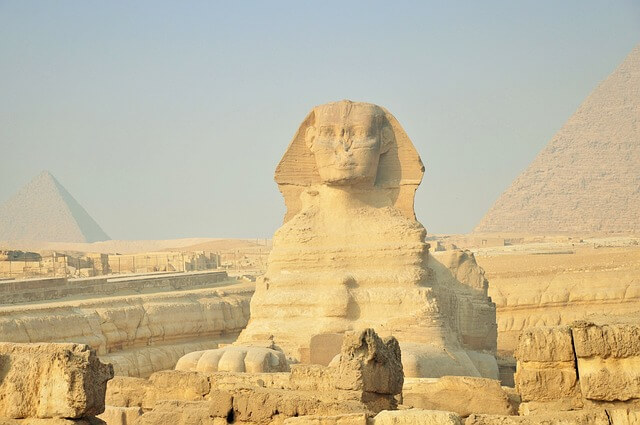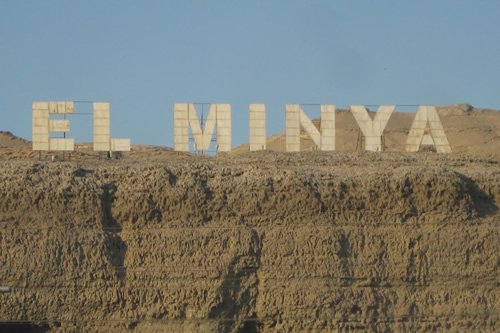A High School Summer in Egypt Studying Arabic
Practical Advice and Tips
By Connie lp

|
|
The Sphinx near Cairo.
|
Preparing to Go to Egypt
After weeks of cramming for Advanced Placement exams and finals, I finally completed them. I could fully concentrate on my second international adventure overseas: a summer in Egypt to study Arabic with AFS Intercultural Programs. This well-established high school exchange organization provides generous financial assistance and scholarships. I had rarely been out of the country, much less further than the borders of California, so I was very excited about my forthcoming trip. I had never been to a place that was so remote and different from my own country. The country name “Egypt” evoked many images in my mind: the cool and crisp Nile River flanked with reeds; a hot and arid desert stretched with miles of sand where travelers from afar crossed using camel; the Great Pyramids and the powerful pharaohs that built them; and local people dressed in long, flowing cotton robes with women covered with headscarves. Until then, my only contact with the Middle Eastern country was primarily through documentaries on “The History Channel,” novels, textbooks from my world history courses, and the “Eyewitness Series” travel guides. Naturally, I had a very romanticized and idyllic notion of Egyptian culture and people, one that was very superficial in retrospect.
Pre-Departure Research
Many questions ran through my head as I tried to figure out what and how to prepare for my time in Egypt. My first thought was to learn the etiquette, customs, and culture before entering the country. My study abroad program provided a list of suggested websites and books to read to prepare for the trip, including those from CultureGrams and Lonely Planet. So, I started by perusing these sources, which proved helpful. They provided valuable tips on various aspects of Egypt, including the climate, standard dress, etiquette, do's and don’ts, cultural faux pas, etc., and significantly reduced the stress and culture shock I felt upon entering the country. In the weeks before my departure, I also started exploring the Arabic language and reading up on Islam, an integral aspect of the local culture and identity. Wherever you go, I highly recommend researching your destination: know the proper etiquette and customs; start exploring the local language and religion. Know what you are getting into and, more importantly, be open-minded.
Packing: What You Need to Bring
Since I would spend just a month in Egypt, packing was relatively low-maintenance; I only carried what I needed in a small duffel bag. To begin packing, start with the essentials: prescription medicine (which is very expensive to ship — do yourself a favor and bring your prescriptions with you), contact lenses, or eyeglasses. My rule is to pack lightly: I had a friend who brought so many unnecessary clothes and other products with her that she threw some out because she could not fit them in her luggage by the end of the summer. Just bring what you need and what you will use.
Because Egypt is scorching and dry from May until October, with temperatures ranging between 80 and 90 degrees at minimum, pack comfortably and wear lightweight clothing to keep yourself cool. I suggest light-colored cotton T-shirts, blouses, and pants, which will absorb less sunlight. Wear comfortable walking shoes. A hat is also practical to protect your head from the heat.
Note to Female Travelers
Egyptians are a conservative and religious people, and they dress accordingly. Ladies, please respect the culture and dress modestly; this means not wearing anything tight-fitting and leaving shorts, mini-skirts, and low-neck tops at home. Wear clothing that will cover your shoulders, arms, and legs. As a foreigner, you will attract plenty of attention (especially as a woman — more on that later), and you do not want any more by dressing inappropriately. I recommend buying a headscarf to blend in with the people and to demonstrate respect for the culture.
Learning the Arabic Language
Arabic has a distinct alphabet with 28 letters, written and read from right to left. The language is written in a calligraphy-style script. The language has three different dialects: Classical, Modern Standard, and Local (which differ by country). On top of that, Arabic is cited by the Foreign Service Institute (FSI) of the U.S. Department of State as being one of the most challenging languages for native English speakers to learn. Indeed, of all the foreign languages I have studied, Arabic wins the prize for being the most demanding and most frustrating. Before I arrived in the Middle East, I did not know Arabic, except for a few phrases such as "assalaamu alaikum" (hello) and "shuk-ran" (thank you). Even though the classes I took in-country were for complete beginners, in retrospect, I wish I had spent more time learning basic grammar and vocabulary, so I would not have been as perplexed. The many options for online language learning software and resources, including audio, are a great way to start learning the language.
Health
The Heat and Drinking Water
While there is no way to guarantee that you will not get sick during your stay in Egypt, you can take several steps to reduce your risk of becoming ill. First, ensure your immunization records are current before you leave the country. Also, be aware of where you are going: a developing world country that is 97% desert. Egypt is incredibly hot during the summer, and dehydration is common, usually followed by fever and sickness. Drink plenty of water, and wear high-factor sunscreen, sunglasses, and a hat. Otherwise, you risk heat exhaustion and sunstroke, which may require urgent medical attention. On the subject of water, I want to note that Egyptian tap water is heavily chlorinated (and tastes awful). Suppose you are not accustomed to it; it will upset your stomach, and you will get diarrhea. In that case, I have witnessed all my American comrades fall ill because of it. To avoid getting sick, drink bottled water, which is readily available and cheap.
Safety
Egypt is a relatively secure and friendly country (at least when I was there a few years ago before the revolution), but knowing how to stay safe is very important. Be as inconspicuous as you can when you are in public. For instance, try to speak softly when on a bus, train, or in the street; do not wear clothing with English writing; and do not flash items such as your passport, jewelry, or money. Keep a low profile. As I mentioned earlier, foreigners will attract unwanted attention. According to the Egyptian Centre for Women’s Rights, 98% of foreign female visitors experience sexual harassment. But it can be handled with proper precautions, including dressing appropriately and staying in a group.

|
|
We lived in a small town with a big sign called El Minya. Photo by Connie lp.
|
A Student Summary
Egypt is a very different country from the United States and you will be exposed to a new environment where the practices and customs are ones you are not familiar with, and where you will perhaps encounter behavior that you find offensive. As such, culture shock will inevitably occur, but immersion is one very importantform aspect of learning experience in studying or living abroad. As long as you stay open-minded, be understanding, observe, and respect the environment and the people when you are in Egypt, you will learn to appreciate the famous warmth of the local culture immensely. Soak in everything around you in a country with an extremely rich history, and be ready to enjoy the experience in ways that may draw you back again and again.
|
For More Info
AFS Intercultural Programs
Egypt Country Guides — Custom and Etiquette
Arabic Language Learning
|
|
